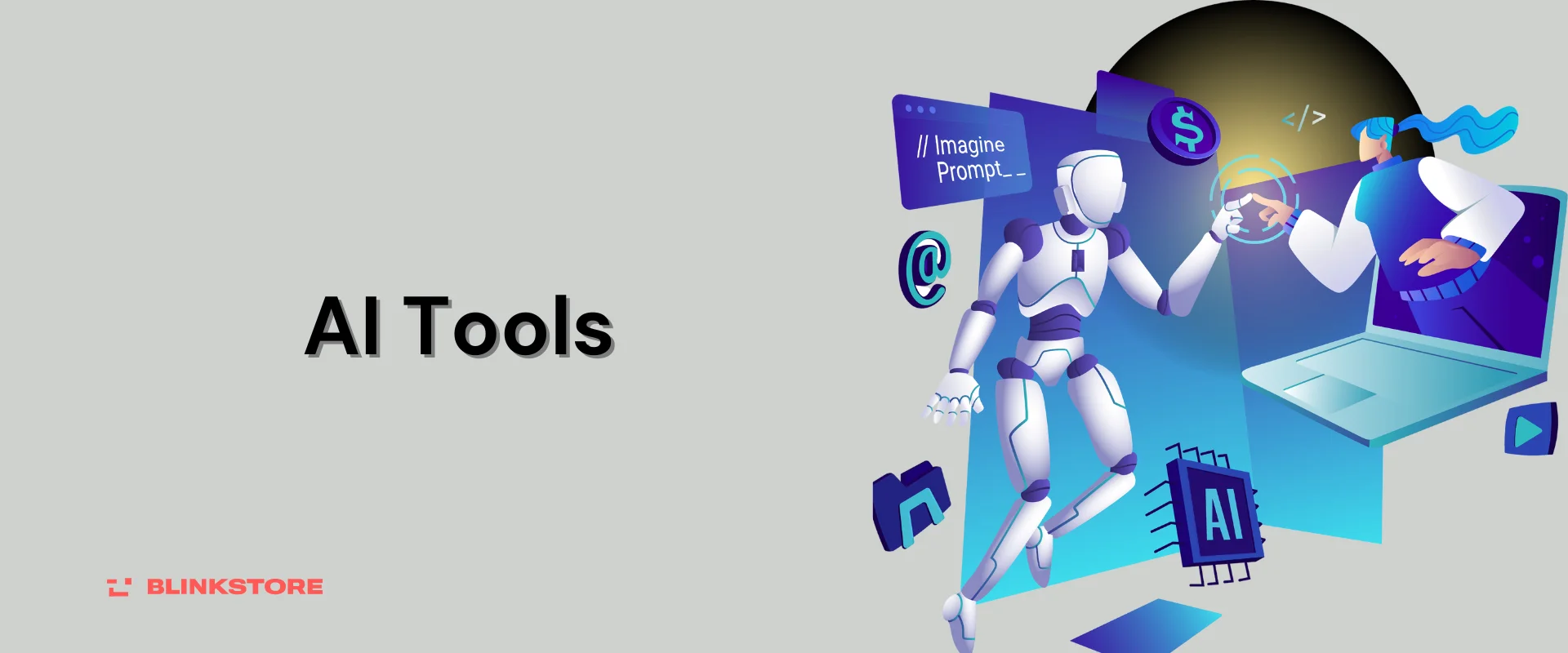When it comes to artificial intelligence, there has been a lot of advancement and growth throughout the years. The majority of this development has been focused on the expansion of enterprises and industries. A number of businesses are developing artificial intelligence products suitable for personal use, nevertheless. Our selection of the top 20 AI tools list for 2024 includes a variety of capabilities and applications, such as natural language processing and predictive analytics, to help you choose the right tool for you. Keep reading to find out more about it.
Table of Contents
Introduction to AI
Artificial intelligence, sometimes known as AI, is the creation of computer systems that are able to carry out operations that ordinarily require human intellect, such as learning, reasoning, problem-solving, and pattern recognition. When it comes to artificial intelligence, there has been a lot of advancement and growth throughout the years. The majority of this development has been focused on the expansion of enterprises and industries.
Several businesses are developing artificial intelligence products suitable for personal use, nevertheless. Several industries, including healthcare, banking, marketing, and transportation, have used AI in diverse ways, and it is quickly changing how we live and work. Self-driving vehicles, virtual assistants, recommendation systems, fraud detection algorithms, and picture recognition software are a few examples of AI-powered technology. With all the advancements in technology and information technology, artificial intelligence is hailed as the next big thing.
What is AI Tools?
AI tools are like smart digital assistants. They’re software or apps that use artificial intelligence (AI) to do specific jobs or solve certain problems. These tools act like little brainiacs, learning, reasoning, solving problems, understanding language, and making decisions. In a nutshell, they’re your tech helpers with a touch of genius!
Types of AI Tools
- Machine learning platforms: These tools employ algorithms to find patterns in huge datasets, then use those patterns to forecast the future or make judgements. They may be used for things like fraud detection, natural language processing, and predictive analytics.
- NLP Tools: Language translation, sentiment analysis, and speech recognition are just a few of the activities that natural language processing (NLP) systems may carry out by analysing and comprehending human language.
- Computer vision tools: These tools analyse photos and videos using deep learning algorithms, which enables them to carry out tasks like object detection, image categorization, and facial recognition.
- Robotics Tools: With the use of these tools, robots may be programmed and controlled to carry out jobs like manufacturing, shipping, and customer service.
- Speech Recognition Tools: Technologies for speech recognition and synthesis are employed to record, comprehend, and produce synthetic speech with a natural-sounding voice.
- Virtual Assistant Tools: Technologies for creating conversational interfaces that can respond to queries and carry out activities include chatbots and virtual assistants. These tools make use of natural language processing and machine learning.
- Tools for detecting fraud: These programmes employ data analysis and machine learning to spot fraudulent behaviours including identity theft and credit card fraud.
- Tools for Personalization: These tools make use of machine learning to give consumers individualised experiences, including suggestions for products and content.
- no code ai tools: no-code ai tools.
How to Use AI Tools?
Using AI tools can vary depending on the specific tool and its intended application. However, here are general steps that provide a guideline for incorporating AI tools into your workflow:
- Identify Your Needs: Clearly define the problem or task you want to address with AI. Determine whether there is an existing AI tool that aligns with your requirements.
- Select the Right AI Tool: Choose an AI tool that suits your needs. Consider factors such as the tool’s capabilities, ease of integration, scalability, and compatibility with your existing systems.
- Understand the Documentation: Familiarize yourself with the documentation and resources provided by the AI tool’s developers. This may include tutorials, guides, and API documentation.
- Data Preparation: If your AI tool involves machine learning, ensure that your data is prepared and formatted appropriately. Clean, relevant, and representative data is crucial for training accurate models.
- Integration: Integrate the AI tool into your existing system or workflow. This may involve connecting APIs, installing software libraries, or implementing other necessary steps.
- Configuration and Training: Configure the AI tool according to your specific use case. If it’s a machine learning tool, you may need to train the model using your prepared data.
- Testing: Conduct thorough testing to ensure the AI tool performs as expected. Evaluate its accuracy, speed, and reliability. Make adjustments if necessary.
- Deployment: Once satisfied with the testing results, deploy the AI tool in a production environment. Monitor its performance and address any issues that may arise.
- Continuous Improvement: AI models can benefit from ongoing improvement. Periodically retrain models with new data to keep them up-to-date and enhance their accuracy.
- Security and Compliance: Ensure that the use of AI tools complies with relevant security and privacy standards. Implement necessary security measures to protect sensitive data.
- Monitor and Maintain: Regularly monitor the performance of the AI tool. Address any issues promptly and update the tool as needed. Maintenance is crucial for long-term success.
- User Training: If the AI tool involves end-users, provide training to ensure they understand how to interact with the tool and make the most of its capabilities.
Why Use AI Tools?
There are several compelling reasons to use AI tools across various industries and applications:
- Automation: AI tools can automate repetitive and time-consuming tasks, allowing humans to focus on more complex and creative aspects of their work. This can significantly increase efficiency and productivity.
- Data Analysis and Insights: AI tools excel at processing and analyzing large volumes of data quickly. They can uncover patterns, trends, and insights that may be challenging or impossible for humans to discover manually.
- Improved Decision-Making: AI tools can provide data-driven insights that help in making more informed and accurate decisions. This is particularly valuable in fields such as finance, healthcare, and business, where decisions can have significant consequences.
- Enhanced Customer Experience: AI-powered chatbots and virtual assistants enable businesses to provide immediate and personalized customer support, improving overall customer satisfaction. Natural Language Processing (NLP) allows for more natural interactions.
- Predictive Analytics: AI tools can analyze historical data to make predictions about future trends, behaviors, or outcomes. This is beneficial in various industries, including finance, marketing, and healthcare.
- Personalization: AI enables the customization of experiences, whether it’s tailoring product recommendations, content suggestions, or marketing messages to individual preferences. This personalization can enhance user engagement.
- Efficient Resource Allocation: AI tools can optimize resource allocation by analyzing data and identifying areas for improvement. This is relevant in supply chain management, logistics, and other resource-intensive processes.
- Language Translation: AI-powered language translation tools facilitate communication across different languages, breaking down language barriers and fostering global collaboration.
- Enhanced Security: AI tools can improve cybersecurity by identifying patterns indicative of potential security threats. They can also automate responses to security incidents, providing a proactive defense against cyber attacks.
- Innovation and Research: AI tools are instrumental in scientific research, drug discovery, and innovation. They can analyze complex datasets, simulate experiments, and assist researchers in making breakthroughs.
Benefits of Ai tools
Here are some of the key benefits of using ai tools over regular ones.
- Higher Efficiency
- Increased Accuracy
- Lower Costs
- Personalization options
- Superior Customer Service
- Improved decision-making
- Increased output
60+ Best AI Tools List for Productivity in 2024
Uncover the world of productivity with a plethora of AI tools spanning diverse domains. Check out this curated list of top-notch AI tools – but remember, the tech landscape evolves, so stay tuned for the latest and greatest:
AI Chatbots
Enhance user engagement and streamline communication with AI chatbots. Explore the capabilities of leading platforms:
1. Dialogflow by Google
Leverage Google’s natural language processing to build intuitive and interactive chatbots. Example: Create a customer support bot that understands user queries and provides relevant information.
2. Replika
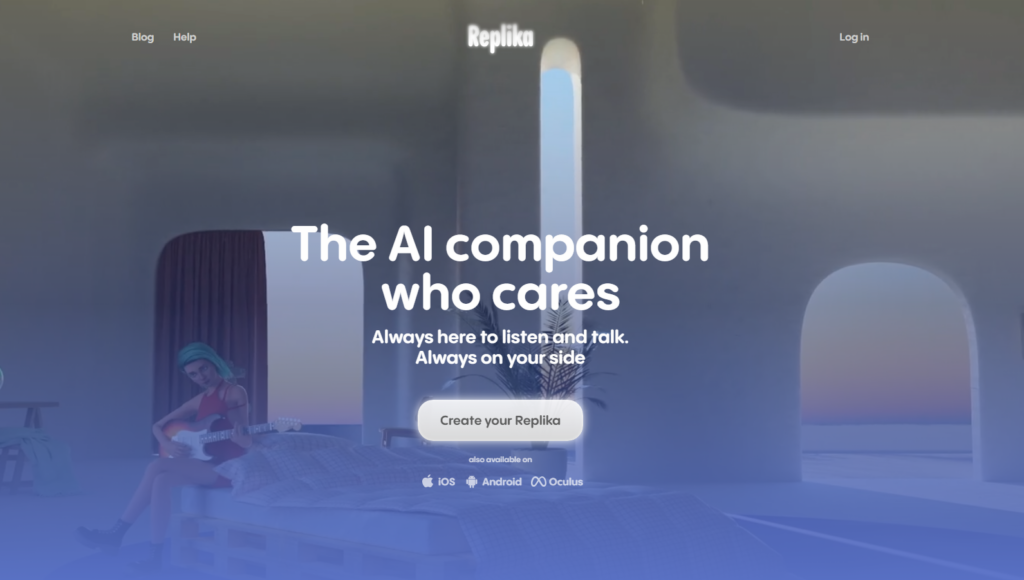
Replika is a chatbot with artificial intelligence (AI) that mimics human communication. The chatbot may offer emotional support, individualised advise, and even participate in philosophical debates. It is built to learn from its interactions with people.
3. Rasa – Open-source Conversational AI
Harness the power of open-source conversational AI with Rasa. For instance, develop a chatbot that can understand user intents and perform specific actions, such as retrieving product information or processing orders.
AI Design Tools
Transform your creative projects by integrating AI into your design process using cutting-edge tools:
4. RunwayML for Design
Empower designers by integrating AI into their creative workflows. For example, use RunwayML to generate unique design elements or apply artistic styles automatically.
5. Dall-E

OpenAI created the Dall-E picture generator, which uses AI. The programme is intended to produce distinctive, realistic visuals from written descriptions.
AI Writing Tools
Elevate your writing and content creation with AI-driven writing tools:
6. ChatGPT

ChatGPT is an interactive AI assistant that answers user enquiries with pertinent and personalised information. It can be connected to several communication platforms, including Facebook Messenger and Slack. ChatGPT makes use of sophisticated machine-learning methods to decipher user questions and provide accurate and appropriate responses.
ALSO READ: 15 Best AI Writing Tools Every Writer Must Learn to Use
7. Gemini (Bard)

The writing helper Bard now known as Gemini uses artificial intelligence to provide tools for enhancing the organisation, consistency, and style of written material. Bard was introduced recently by Google and currently available only to the beta testers. It can spot grammatical and spelling mistakes, and it makes recommendations for writing style and coherence improvements using machine learning methods. For authors, bloggers, and companies who desire to raise the calibre of their written content, Bard can be helpful.
8. Grammarly

One of the greatest online AI writing tools is Grammarly. Grammarly is a writing helper driven by AI that provides real-time suggestions for grammar and spelling corrections as users type. It may be incorporated into many other programmes, such as word processors, social networking sites, and email.
AI Testing Tools
Ensure the quality and reliability of your applications with AI-driven testing tools:
9. TensorFlow
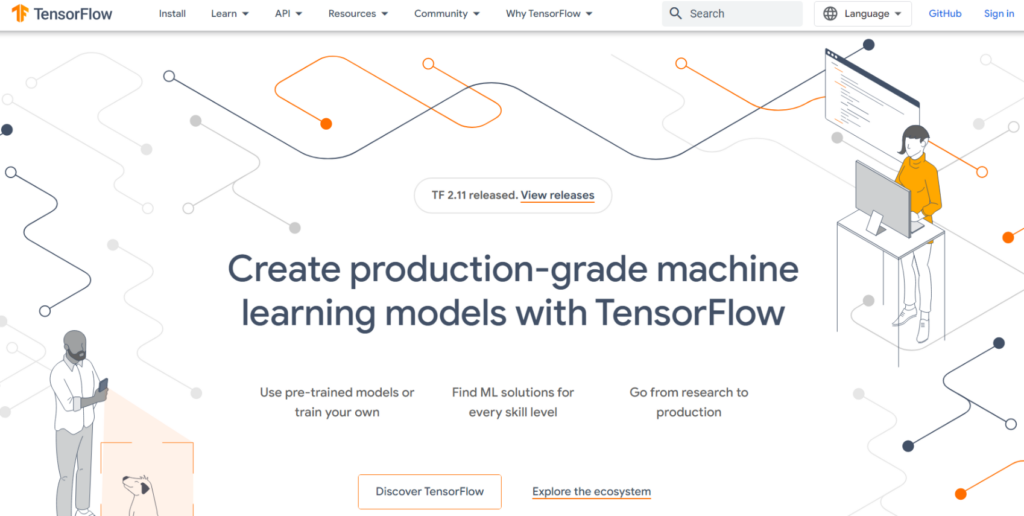
The open-source platform ensorFlow is used to create and train machine learning models. The platform provides a number of features, such as pre-built APIs, data pretreatment tools, and a flexible architecture that can be used to build different types of models.
10. Applitools – Visual AI Testing
Implement visual AI for automated testing of web and mobile applications. For instance, use Applitools to detect visual bugs and ensure a consistent user experience across different devices.
11. Anthropic
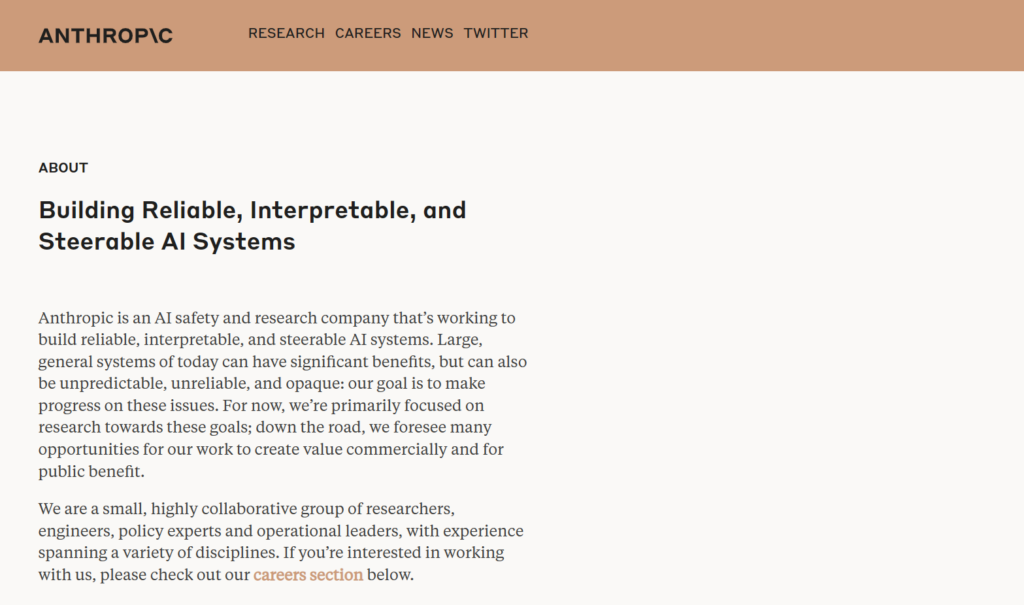
Anthropic is a successful startup that does AI research to develop “robust and interpretable machine learning systems.” The company’s technology is meant to make AI use more ethical and responsible while also making it more transparent and clear.
12. Mabl – Intelligent Test Automation
Enhance your testing workflows with Mabl’s intelligent test automation. Leverage self-healing capabilities to maintain reliable test scripts even as your application evolves.
AI Copywriting Tool
Craft compelling marketing copy and blog posts with the assistance of AI:
13. Jasper

With the help of the generative AI platform Jasper, your team can create content that is uniquely suited to your brand. With Jasper, you may create your own blogs, articles, books, scripts, and other types of content. All you have to do is choose a subject, fill out the form with your details, and Jasper will produce the content.
Also Read: 10 Amazing AI Marketing Tools Marketers Must Know About
14. Writesonic – Copy Generation
Accelerate content creation with Writesonic. Generate marketing copy, blog posts, and more with ease, saving valuable time in your content marketing efforts.
AI SEO Tools
Optimize your content for search engines with AI-driven SEO tools:
15. Semrush – Keyword Researcher
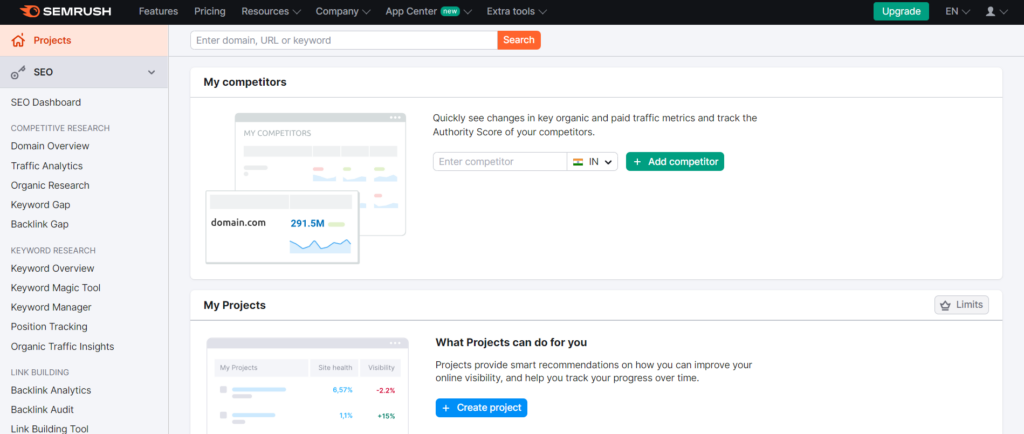
Use Semrush to do keyword reasearch effieciently. This is a productive AI tool.
16. MarketMuse – Content Optimization
Utilize MarketMuse to optimize your content for SEO and improve search rankings. Leverage AI insights to create content that aligns with search engine algorithms.
17. BrightEdge – SEO and Content Marketing
Enhance your SEO strategy with BrightEdge, an AI-powered platform that integrates SEO and content marketing for maximum impact.
AI Tools for HR
Revolutionize your recruitment and talent acquisition processes with AI:
18. Ideal – AI Recruiting
Streamline your recruitment efforts using Ideal’s AI capabilities. Optimize candidate matching and improve the efficiency of the hiring process.
19. Paradox AI
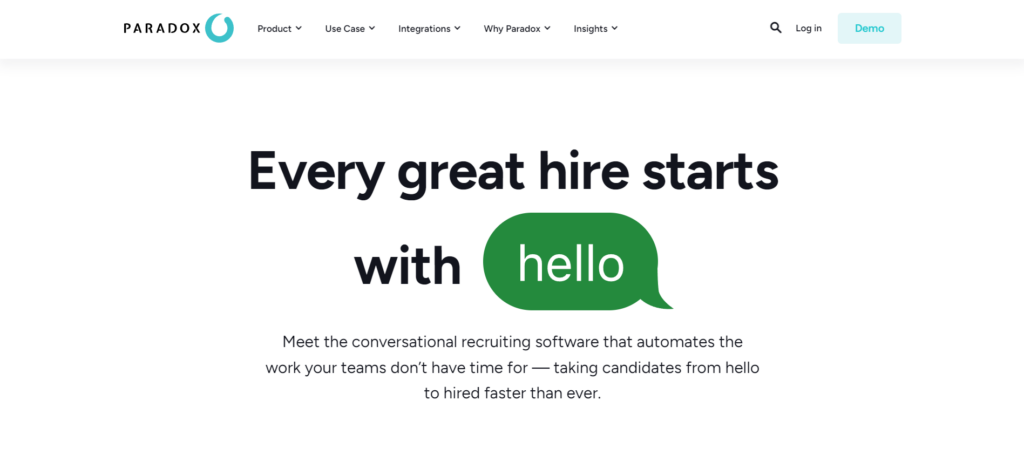
Improve your hiring process with AI-powered resume screening, interview scheduling, and candidate assessments.
20. Textio – Job Posting Analysis
Attract a diverse pool of candidates by analyzing job postings with Textio’s AI. Optimize language and content to appeal to a broader audience.
Best AI Marketing Tools
Elevate your marketing efforts with AI-driven platforms:
21. HubSpot – AI in Inbound Marketing
Integrate AI into inbound marketing strategies with HubSpot. Enhance customer relationship management and personalize marketing campaigns for improved engagement.
22. Adzooma – AI-based Advertising Optimization
Optimize online advertising campaigns using Adzooma’s AI-based platform. Improve ad performance and achieve better ROI through automated campaign adjustments.
AI Tools for Market Research
Gain valuable insights and streamline market research with AI tools:
23. AYTM (Ask Your Target Market) – AI Surveys
Conduct market research surveys efficiently with AYTM. Utilize AI to analyze responses and extract meaningful insights.
24. Adept

Adept is a machine learning research and product lab that develops general intelligence by empowering human and computer collaboration. It is advantageous for firms that want to learn from their data since it provides tools for data analytics, predictive modelling, and automated reporting. Adept may be integrated with current workflows and systems and leverages cutting-edge machine learning techniques to deliver precise forecasts and insights.
25. Zappi – AI-driven Market Research
Leverage Zappi’s AI-driven platform for market research and gain actionable insights for informed decision-making.
26. Bing AI

Bing Ai is another interactive assistant that was recently introduced by Microsoft. The Bing search engine includes several artificial intelligence technologies and capabilities called Bing AI. The AI technologies give tailored suggestions, boost picture and video search capabilities, and assist to increase the accuracy of search results.
AI Tools for Business
Empower your business with AI-driven intelligence and automation:
27. Tomedes Pre-Translation Toolkit | AI-powered translation tools

Tomedes Pre-Translation Toolkit is a one-stop solution for translators and businesses, offering a suite of AI-powered tools to streamline translation preparation. The platform provides a range of functions, including a language detector, topic detection tool, key terms glossary, source text checker, and translation difficulty checker. These tools work together to ensure content is accurately prepared, consistent, and culturally relevant, improving overall translation efficiency and reducing errors.
28. Watson

IBM’s Watson is a collection of AI-enabled tools and services. The platform provides a number of functions, such as predictive analytics, picture and audio recognition, and natural language processing.
29. Sisense – AI in Business Intelligence
Utilize Sisense’s business intelligence platform to derive insights from data with AI-driven analytics. Enhance decision-making and strategic planning.
30. OpenCV
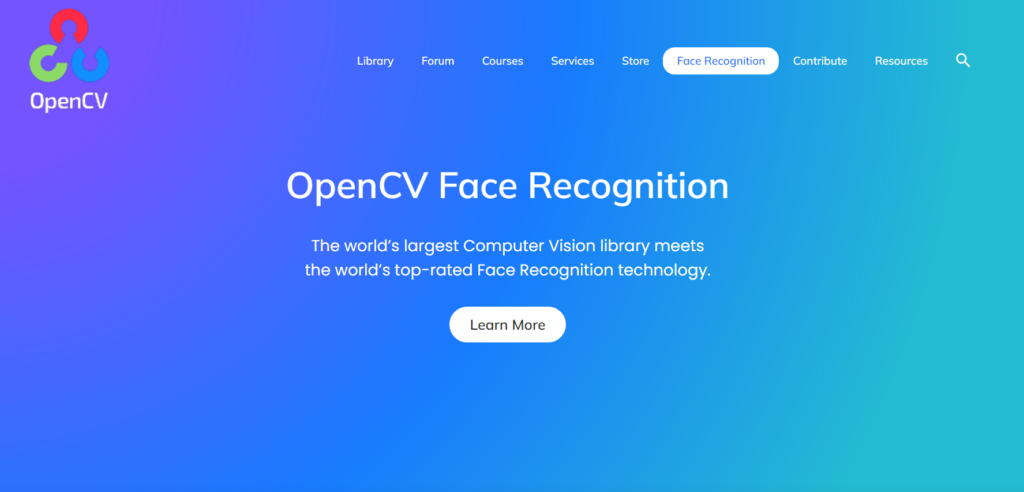
An open-source computer vision library called OpenCV provides a number of functions for processing both still and moving images. Robotics, surveillance, and augmented reality are just a few of the applications that the cross-platform framework may be used for.
31. UiPath – RPA for Business Processes
Automate repetitive business processes using UiPath’s Robotic Process Automation (RPA) tool. Improve efficiency and reduce manual workload.
AI Tools for Presentation
Create impactful presentations with the assistance of AI:
32. Beautiful.AI – AI-powered Presentation Design
Design visually appealing presentations effortlessly with Beautiful.AI. Let AI assist in layout, design, and content organization for engaging presentations.
33. Remini

Remini is an AI-driven programme for enhancing and restoring antique pictures. The tool may enhance image quality, eliminate flaws and scratches, and add colour to monochrome photographs.
34. Zoho Show – AI for Smart Presentations
Elevate your presentations with Zoho Show, utilizing AI for smart features. Enhance audience engagement with intelligent presentation tools.
Best AI Tools for Students
Support student learning with AI tools tailored for education:
35. Grammarly (Edu version) – Academic Writing Support
Provide students with AI-driven writing support using Grammarly’s educational version. Enhance academic writing skills and promote clear communication.
36. Google’s AutoML for Students
Introduce students to machine learning with Google’s AutoML. Enable hands-on experience in creating and training machine learning models.
AI Tools for Social Media
Optimize social media management with AI-powered tools:
37. Hootsuite – AI in Social Media Management
Streamline social media management tasks with Hootsuite’s AI integration. Schedule posts, track analytics, and engage with your audience more effectively.
38. Buffer – AI for Social Media Posts
Utilize Buffer’s AI capabilities to schedule and analyze social media posts. Improve the timing and content of your social media updates.
AI Tools for Video Editing
Efficiently edit videos with AI-integrated tools:
39. Sora.AI – Video editing
Sora.ai is a text-to-video model developed by OpenAI. Allows you to generate realistic and imaginative video clips based on simple text descriptions.
40. RunwayML for Video Editing
Integrate AI into video editing processes with RunwayML. Enhance creativity by experimenting with AI-powered effects and editing tools.
41. Lumen5 – AI Video Creation
Automate video creation from text content using Lumen5. Utilize AI to generate engaging video content for marketing or educational purposes.
AI Tools for Customer Service
Enhance customer support and engagement with AI-driven tools:
42. Zendesk – AI for Customer Support
Improve customer support workflows with Zendesk’s AI capabilities. Enhance ticket management, automate responses, and provide a seamless customer experience.
43. Freshdesk – Automated Customer Service
Implement Freshdesk’s AI features for automated customer service. Streamline issue resolution and improve customer satisfaction with AI-driven support.
Best AI Paraphrasing Tools
Efficiently rewrite content with AI-powered paraphrasing tools:
44. Quillbot

Quillbot is an AI-powered writing helper that provides tools for rewriting, summarising, and improving content. It may provide suggestions for improvements to sentence structure and writing style and employs machine learning techniques to find grammatical and spelling mistakes. Students, authors, and corporations looking to increase the calibre of their written content may all benefit from Quillbot.
45. Spinbot – AI Content Rewriting
Optimize content rewriting with Spinbot’s AI capabilities. Ensure uniqueness and readability in your paraphrased content.
AI Web Design Tools
Simplify website design with AI-driven tools:
46. Wix ADI – AI-assisted Website Design
Expedite website design with Wix ADI’s AI assistance. Create visually appealing websites tailored to your preferences.
47. Bookmark – AI-driven Website Builder
Explore Bookmark’s AI-driven website builder for a user-friendly and efficient web design experience. Customize your site with ease using AI-assisted tools.
48. AI Agents
Experience natural language conversations with AI agents:
49. Siri
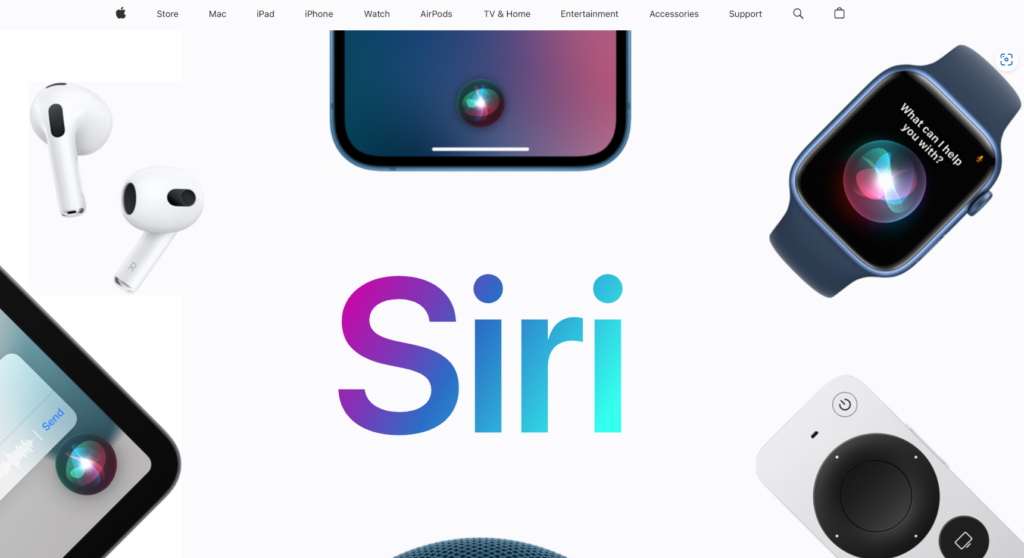
Apple’s AI-powered virtual assistant with speech recognition is called Siri. It is also one of the popular AI assistants. Making phone calls, sending messages, and playing music are just a few of the duties the assistant is designed to aid customers with.
50. Google’s Duplex – Natural Language Conversations
Engage in natural language conversations with Google’s Duplex AI system. Witness AI-driven interactions for tasks such as restaurant reservations.
51. Google Assistant

The voice-activated, AI-powered virtual assistant known as Google Assistant was created by Google. Users of the assistant may use it to create reminders, send messages, and seek directions, among other things.
52. Alexa

The AI-powered virtual assistant Alexa is an Amazon product. The virtual assistant is made to aid users with a range of activities, such as creating reminders, placing calls, and managing smart home appliances.
AI 3D Modeling
Revolutionize 3D modeling with AI-integrated tools:
53. RunwayML for 3D – AI in 3D Modeling
Incorporate AI into the 3D modeling process using RunwayML. Experiment with AI-generated elements and enhance your creative projects.
54. DeepDream – AI for Unique 3D Designs
Generate unique 3D designs by applying AI algorithms with DeepDream. Explore creative possibilities with AI-driven enhancements.
AI Music Generators
Compose music effortlessly with AI music generators:
55. Amper Music – AI Music Composition
Explore AI-powered music composition with Amper Music. Create unique musical pieces tailored to your preferences.
56. AIVA – AI-based Music Composition Software
Unleash your creativity in music composition using AIVA’s AI-based software. Generate compositions with personalized styles and themes.
AI Painting and Drawing Tools
Create stunning visual art with AI-powered painting and drawing tools:
57. DeepArt.io – AI Art Transformation
Transform photos into unique artworks using AI with DeepArt.io. Experiment with artistic styles and create visually captivating pieces.
58. Playground AI

Playground is another free AI image generator where you can add instructions and generate high-quality images or graphics for free. You can utilise these images in social media posts, blogs and articles.
59. Artbreeder – AI for Visual Art Manipulation
Manipulate and create visual art with AI using Artbreeder. Blend and modify images to produce one-of-a-kind visual compositions.
Best AI Tools for Coding
Boost coding efficiency with AI-driven coding tools:
60. TabNine – AI-powered Autocompletion
Supercharge your coding workflow with TabNine’s AI-powered autocompletion. Experience enhanced code suggestions and improved productivity.
61. GitHub Copilot
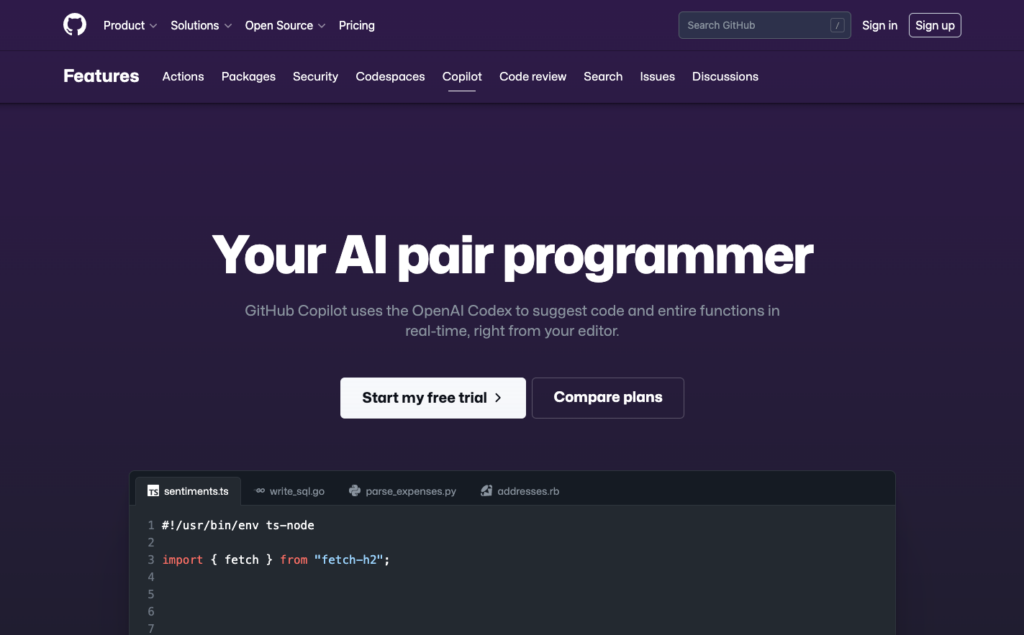
Copilot is one of the ai development tools, it is developed by Microsoft owned Github. Elevate your coding experience with GitHub Copilot. Leverage AI assistance for code generation, suggestions, and faster development.
Best AI Tools for Meetings
Optimize virtual meetings with AI-integrated tools:
62. Krisp – AI Noise Cancellation
Enhance virtual meetings with Krisp’s AI noise cancellation. Ensure clear communication by eliminating background noise.
63. Zoom – AI Features for Meetings
Utilize Zoom’s AI features for virtual meetings, including transcription and virtual backgrounds. Enhance the overall meeting experience with intelligent features.
Application of AI in modern World
Here are some of the most widely used applications of Ai Tools in today’s world:
AI In Education / ai research tools
Artificial intelligence (AI) is gradually making its way into the educational field, helping to boost efficiency and putting a greater emphasis on students than on office or administrative tasks. It may be used to automate office procedures, provide intelligent content, customise education, and offer voice assistants. It can also be used to monitor students’ data and generate habits, lesson plans, reminders, study guides, flash notes, frequency or revision, etc. to create a rich learning experience.
AI in E-Commerce
To enhance consumer experience and lower credit card theft, artificial intelligence technology is employed to construct recommendation engines and virtual shopping assistants. Chatbots may interact with consumers in real-time, and AI-powered assistants employ natural language processing to make the dialogue feel human and intimate. Two of the biggest problems E-Commerce businesses have are credit card theft and bogus reviews. Artificial intelligence (AI) can assist in spotting and handling false reviews.
AI in Lifestyle
Autonomous cars, spam filters, face recognition, recommendation systems, and other aspects of AI have a significant impact on our way of life. Autonomous cars employ object detection to prevent accidents, spam filters to remove spam, face recognition to detect and identify for secure access, and machine learning to educate computers to think and grow like people. In order to boost user engagement, recommendation systems gather user data and provide consumers personalised recommendations. Almost all sectors make extensive use of these applications.
AI in Navigation
To increase the precision, effectiveness, and safety of navigation and location-based services, artificial intelligence (AI) is being employed more and more in the navigation sector. Real-time traffic data is analysed by AI algorithms to determine the most effective routes, forecast vehicle maintenance requirements, and offer individualised suggestions for attractions along a route. While autonomous vehicle technology driven by AI has the potential to revolutionise transportation by lowering accidents, boosting efficiency, and removing the need for human drivers, it can also deliver real-time updates on traffic, weather, and other factors.
AI in Healthcare
By offering a wide range of possible applications to enhance patient outcomes, lower costs, and boost efficiency, AI is transforming healthcare. AI algorithms can detect illnesses, interpret medical pictures more accurately than people, and help design new drugs. Chatbots can help with patient triage and can offer answers to frequent health-related concerns, while virtual nursing assistants powered by AI can monitor and support patients around-the-clock. AI may be used to develop individualized treatment regimens, track the course of diseases, and identify people who are at risk of developing particular ailments.
AI in Social Media
AI is becoming more and more significant in social media platforms, offering a variety of applications to enhance user experiences and boost platform effectiveness. AI algorithms may be used to tailor information and advertisements for users, identify fake news and hate speech, and suggest accounts to follow that are relevant to them. AI can help with spam filtering and content moderation by highlighting potentially damaging information for evaluation. AI-powered chatbots may also be utilized to offer real-time customer service and respond to consumer inquiries.
AI in Marketing / ai design tools
By offering a wide range of applications to enhance targeting, personalization, and efficiency, AI is revolutionizing the marketing sector. Huge volumes of data may be analyzed by AI systems to find trends and preferences, enabling targeted advertising and individualized marketing efforts. Chatbots powered by AI may also offer in-person customer service and respond to frequently asked inquiries, freeing up marketing employees to concentrate on more difficult jobs. AI may also help with lead creation, lead prediction, price optimization, and product positioning, among other tasks.
AI as Chatbots
A variety of businesses are seeing an increase in the use of AI-powered chatbots, which offer a quick and affordable method to respond to client questions and offer help. Chatbots offer 24/7 personalized help and support by understanding and responding to user inquiries using natural language processing and machine learning techniques. Chatbots may help with a variety of activities, such as organizing appointments, making product suggestions, and responding to frequently asked queries. Chatbots may help organizations lower costs by processing a large volume of enquiries without the need for human participation, in addition to enhancing customer happiness.
Conclusion
In conclusion, the fast advancement of artificial intelligence (AI) has produced a wide range of tools that are revolutionising several fields of endeavour and spurring creativity. The top 20 AI solutions projected to dominate the market in 2024 show how AI has the enormous potential to boost productivity, customer happiness, and overall performance.
These artificial intelligence (AI) technologies are providing a variety of features and applications that are altering the way people work and interact with technology, from picture identification to speech analysis, chatbots, and recommendation systems. It is possible that even more potent tools will be created as AI develops, opening up countless opportunities for both corporations and people.
FAQs
-
What are the most widely used AI tools on the market?
Depending on the sector, different AI tools are more commonly utilised, however some of the most well-known ones are Chat GPT, Watson, Google Assistant, Siri, Alexa, Grammarly, OpenCV, and SEMrush.
-
How do I choose the best AI tool for my company’s needs?
Taking into account your business objectives, the sort of data you have, and the difficulty of the tasks you want the tool to complete will help you identify the ideal AI tool for your company’s requirements.
-
Are AI tools challenging for those without technical backgrounds to use?
Even while certain AI solutions might need technical know-how to set up and install, many manufacturers are attempting to make their tools more accessible and user-friendly for non-technical users.
-
How much are AI tools usually going to cost?
The price of AI tools can vary greatly depending on the seller, the capabilities offered, and the difficulty of the jobs they are capable of completing. Some tools could cost thousands of dollars per month or more, while some might be offered for free or with a freemium pricing model.
-
Is it possible to incorporate AI technologies with other business software?
Yes, it is frequently possible to use APIs, plugins, or custom interfaces to combine AI technologies with other business applications. The particular requirements, however, will vary depending on the equipment and software you’re utilizing.
-
Do I need a dedicated data scientist on staff if I want to use AI tools correctly?
It’s not always required to have a specialized data scientist on staff; however, it might help to harness the advantages of AI tools.
-
What are AI tools?
AI Tools are machine learnings applications and tools that are trained on large data sets to perform a specific task. For example, GitHub Copilot is trained on code on open source applications to create an AI tool that can generate code.
-
Which is the best AI tool? What are some of the main tools in AI?
There are many great AI tools in the market depending on your use case and needs. Some of the widely popular AI tools are: ChatGPT, Copilot, DALL-E, BARD, etc.
-
What is the most popular AI?
As of 2024, ChatGPT by OpenAI is the most popular AI tool on the Internet and around the world. ChatGPT is a text based Natural Language processing AI tool, which means that users can ask ChatGPT any question it’ll try to answer it best given the data sets it was trained on. Which makes it very easy to use. It crossed 5 million+ users within days of launching.
-
Which AI app is free?
Several AI apps offer free versions or features. Some popular ones include
Google’s AI Experiments: Many of Google’s AI experiments and tools are available for free.
IBM Watson Studio (Free Plan): IBM Watson Studio offers a free plan with limited resources.
ChatGPT (Free Access): OpenAI provides free access to ChatGPT, although there is also a subscription plan called ChatGPT Plus for additional benefits. -
Is AI tools free?
The availability of free AI tools varies. Some AI tools offer free versions with limited functionalities, while others may require a subscription or one-time payment. Open-source AI tools, like TensorFlow and PyTorch, are generally free to use. It’s important to check the pricing details of each specific AI tool or platform.
-
Is ChatGPT free to use?
Yes, ChatGPT is available for free to users. OpenAI offers free access to ChatGPT for users to interact with the model. Additionally, there is a subscription plan called ChatGPT Plus, which offers benefits like general access during peak times, faster response times, and priority access to new features. The subscription plan is available for a monthly fee.
-
Is ChatGPT a type of AI?
Yes, ChatGPT is a type of AI, specifically a language model developed by OpenAI. It is based on the GPT-3 architecture (Generative Pre-trained Transformer 3) and is designed to generate human-like text based on the input it receives. ChatGPT can be used for a variety of natural language processing tasks, including conversation, content generation, and text completion.
-
Is AI app safe?
The safety of AI apps depends on various factors, including the design, implementation, and usage context. Many AI applications are developed with safety considerations in mind, and developers often implement measures to mitigate potential risks. However, it’s crucial to be aware of privacy and security aspects, especially when dealing with sensitive data. Users should follow best practices and guidelines provided by the AI app developers to ensure safe usage.
-
How do I use Google AI?
Google offers various AI tools and services that can be accessed through its AI platform. Here are general steps on how to use Google AI:
Explore AI Experiments: Visit Google’s AI Experiments website to explore various creative and interactive AI projects.
Google Cloud AI Services: If you’re interested in using Google’s AI services for development, visit the Google Cloud AI platform. It provides services like Vision AI, Natural Language Processing (NLP), and more.
TensorFlow: If you’re into machine learning, TensorFlow is an open-source machine learning
